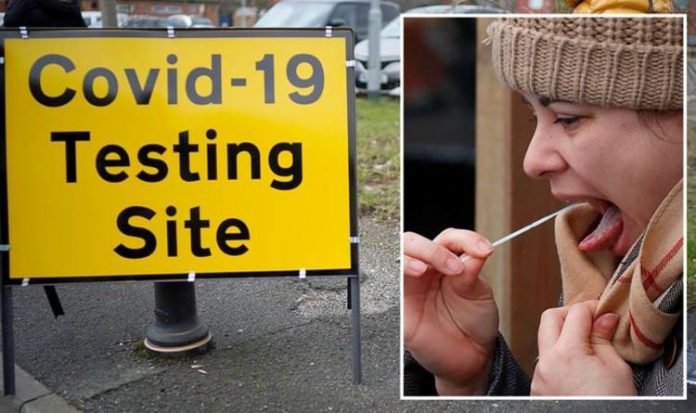Surge testing was rolled out across the UK earlier this year after new coronavirus variants were detected. Surge testing has been implemented in a bid to drive down the rate of infection during outbreaks of more highly transmissible Covid variants. Foreign Secretary Dominic Raab said mass testing will form a “key part” of the strategy to allow lockdown to be eased “safely and responsibly”.
Surge testing was this week named as a key strategy within Britain, particularly in light of its plan to ease lockdown restrictions.
Plans for nationwide surge testing are expected to form a key part of moving out of lockdown restrictions.
The move is seen as a means by which to extend asymptomatic testing across the country.
Speaking on Wednesday, Mr Raab said the aim was to carry out testing “at scale and at pace so that when you do have upticks of the virus, we can come down on it like a tonne of bricks”.
READ MORE: Covid rapid testing: Will rapid tests be needed to go to the pub?
The Government defines surge testing as increased testing, including door-to-door testing in some areas and enhanced contact tracing in some areas of England.
This initiative involves testing people who do not have any symptoms of coronavirus.
The surge testing programme began in February and has thus far been used to track and monitor emerging cases of new Covid variants to better understand them.
Surge testing is being conducted in several areas of the country including parts of London, the North West and South West.
Surge testing will now be rolled out across parts of Leeds after the South African coronavirus variant was detected in the region.
Additional testing and genomic sequencing is being deployed to targeted areas in Leeds LS8, including parts of Harehills and the area just north of Easterly Road.
The Department of Health and Social Care said: “Extra testing is being introduced in addition to existing extensive testing, and in combination with following the current lockdown rules and remembering Hands Face Space advice, will help to monitor and suppress the spread of the virus.
“Positive cases will be sequenced for genomic data to help understand COVID-19 variants and their spread within these areas.
“People living within this targeted area are strongly encouraged to take a COVID-19 test when offered, whether they are showing symptoms or not.
“People with symptoms should book a test in the usual way, and those without symptoms should visit their local authority website for more information.”
DON’T MISS
Covid surge testing: New postcodes listed after variant cases detected [INSIGHT]
Surge testing extended in regions across UK after COVID variant found [EXPLAINER]
Covid surge testing areas: Full UK postcodes lists as mutations rise [ANALYSIS]
The surge testing data will be evaluated and positive cases will be sequenced for genomic data to help understand COVID-19 variants within each of these areas.
The three most concerning Covid variants which have hit the UK so far are the Kent, South African and Brazilian variants.
The South African variant has a mutation called E484K, which scientists believe might make it less responsive to the coronavirus vaccines.
This is because it causes a change in the spike protein which has an important role in helping the virus enter cells and the body’s immune response to it.
Who needs to get a test?
Anyone in one of the listed areas or postcodes should get a PCR test for coronavirus so long as they are aged 16 and over.
You should get a test even if you have no symptoms of coronavirus or have had the Covid vaccination.
In addition, you should also take a test even if you have already tested positive for coronavirus, but not if you tested positive within the last 90 days.







